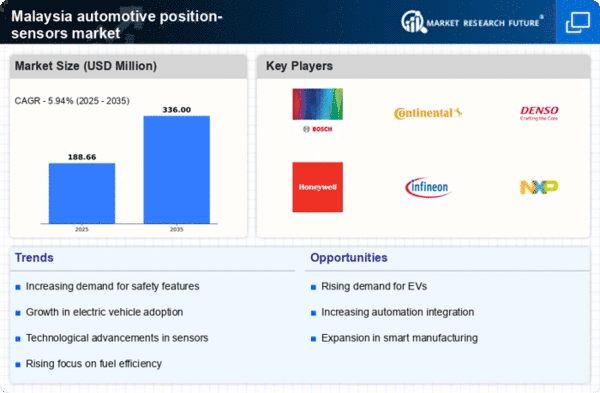Rise of Electric Vehicles
The automotive position-sensors market in Malaysia is witnessing a transformation with the rise of electric vehicles (EVs). As the government promotes the adoption of EVs through incentives and infrastructure development, the demand for position sensors tailored for electric drivetrains is increasing. These sensors play a crucial role in optimizing battery management systems and enhancing vehicle efficiency. The automotive position-sensors market is likely to see a surge in demand as manufacturers adapt to the evolving landscape of electric mobility. This shift towards EVs presents a unique opportunity for sensor manufacturers to innovate and cater to the specific needs of this emerging market segment.
Focus on Safety Regulations
The automotive position-sensors market in Malaysia is significantly influenced by stringent safety regulations imposed by the government. These regulations mandate the incorporation of advanced safety features in vehicles, including position sensors that monitor critical parameters such as steering and braking. As a result, automotive manufacturers are compelled to invest in high-quality position-sensing technologies to comply with these regulations. The automotive position-sensors market is expected to benefit from this trend, as the demand for safety-compliant vehicles drives the adoption of sophisticated sensor technologies. This focus on safety not only enhances consumer confidence but also propels market growth.
Growing Automotive Production
The automotive position-sensors market in Malaysia is experiencing growth due to the increasing production of vehicles. In recent years, Malaysia has positioned itself as a key player in the automotive industry, with production figures reaching approximately 500,000 units annually. This surge in vehicle manufacturing necessitates the integration of advanced position sensors to enhance vehicle performance and safety. As manufacturers strive to meet both local and export demands, the automotive position-sensors market is likely to expand, driven by the need for precision in vehicle dynamics and control systems. The automotive position-sensors market is thus poised for significant growth as production levels continue to rise.
Increasing Aftermarket Opportunities
The automotive position-sensors market in Malaysia is also benefiting from the growing aftermarket segment. As vehicle ownership rises, the demand for replacement and upgrade of automotive components, including position sensors, is increasing. Consumers are becoming more aware of the importance of maintaining vehicle performance, leading to a rise in aftermarket services. The automotive position-sensors market is likely to capitalize on this trend, as service providers and retailers expand their offerings to include high-quality position sensors. This growth in the aftermarket presents a lucrative opportunity for manufacturers to diversify their revenue streams and enhance market presence.
Technological Integration in Vehicles
The automotive position-sensors market in Malaysia is being driven by the integration of advanced technologies in vehicles. Innovations such as autonomous driving and advanced driver-assistance systems (ADAS) require precise position sensing for optimal functionality. As Malaysian automotive manufacturers increasingly adopt these technologies, the demand for high-performance position sensors is expected to rise. The automotive position-sensors market is thus likely to expand as manufacturers seek to enhance vehicle capabilities and consumer experiences through technological advancements. This integration not only improves vehicle performance but also aligns with global trends towards smarter, more connected vehicles.























Leave a Comment